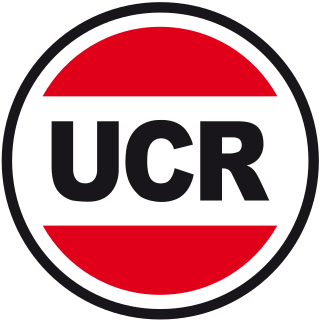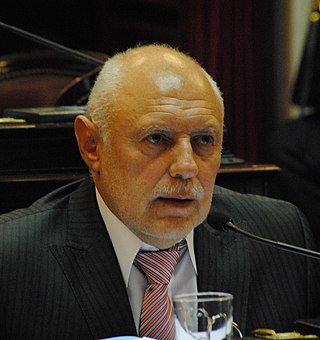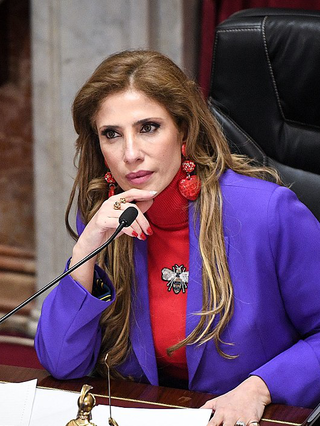
The Radical Civic Union is a centrist and liberal political party in Argentina. It has been ideologically heterogeneous,ranging from conservatism to social democracy,but since 1995 it has been a member of the Socialist International.

Argentina held a presidential election on Sunday,27 April 2003. Turnout was 78.2%. No one presidential candidate gained enough votes to win outright,but the scheduled runoff was cancelled when former president and first-round winner Carlos Menem pulled out just 4 days before the planned runoff on 18 May,handing the presidency to runner-up,Santa Cruz Province Governor Néstor Kirchner of the Front for Victory. Legislative elections were held on 12 dates,27 April,24 August,31 August,7 September,14 September,28 September,5 October,19 October,26 October,9 November,16 November and 23 November. As of 2023,this marked the last time that both the president-elect and vice president-elect ticket were both men.
Argentina held national parliamentary elections on Sunday,23 October 2005. For the purpose of these elections,each of the 23 provinces and the Autonomous City of Buenos Aires are considered electoral districts.

The Civic Front for Santiago is a Peronist provincial political coalition in Santiago del Estero Province,Argentina. It operates as part of Frente de Todos.

Gerardo Zamora is an Argentine politician who has served as Governor of Santiago del Estero since 2017,and previously from 2005 to 2013. He is a member of the centrist Radical Civic Union (UCR).

Carlos Arturo Juárez was an Argentine politician,Justicialist Party governor or ruler by proxy of Santiago del Estero Province over a 55-year period,leading to his description as a caudillo.

Argentina held national presidential and legislative elections on Sunday,28 October 2007,and elections for provincial governors took place on staggered dates throughout the year. For the national elections,each of the 23 provinces and the Autonomous City of Buenos Aires are considered electoral districts. Voter turnout was 76.2%. Buenos Aires Province Senator and First Lady Cristina Fernández de Kirchner of the Front for Victory won the election by 45.28% of votes against Elisa Carrióof Civic Coalition ARI,making her the second female president of Argentina and the first female president to be directly elected. She broke the 40 percent barrier and won in the first round. Elisa Carriówon in the city of Buenos Aires and came second with more than 20 percent of the votes. Third was Roberto Lavagna,who won in Córdoba.

Eduardo Segundo Brizuela del Moral was an Argentine Radical Civic Union (UCR) politician. He was governor of Catamarca Province from 2003 to 2011,heading the Civic and Social Front of Catamarca.

Julio César Cleto Cobos is an Argentine politician who was the Vice President of Argentina in the administration of President Cristina Fernández de Kirchner from 2007 to 2011. He started his political career as member of the Radical Civic Union party (UCR),becoming Governor of the Province of Mendoza in 2003. He was expelled from the UCR in 2007,and was then selected by presidential candidate Cristina Fernández de Kirchner,of the ruling Front for Victory (FpV),as her candidate for vice-president in the elections of that year,which they won.

Kirchnerism is an Argentine political movement based on populist ideals formed by the supporters of spouses Néstor Kirchner and Cristina Fernández de Kirchner,who consecutively served as Presidents of Argentina. Although considered a branch of Peronism,it is opposed by some factions of Peronists and generally considered to fall into the category of left-wing populism.

Mario Jorge Colazo,"El Potro",is an Argentine Radical Civic Union (UCR) politician. He was governor of Tierra del Fuego from 2004 to 2005,when he was removed from office by the Supreme Court. From 2001 to 2004,and again from 2007 to 2013,he sat in the Argentine Senate.

Ada Rosa del Valle Itúrrez de Cappellini is an Argentine Justicialist Party politician. She was a National Senator for Santiago del Estero Province from 2007 to 2019,elected for the Civic Front for Santiago and supporting the majority block of the Front for Victory.

Ernesto Sanz is a former Argentine politician of the Radical Civic Union and one of the founders of Cambiemos. He served in the Argentine Senate representing Mendoza Province from 2003 to 2015.

Gerardo Rubén Morales is an Argentine politician,former Governor of Jujuy Province (2015–2023) and Secretary General of the Radical Civic Union.

Pablo Federico Verani was an Italian-born Argentine politician,formerly of the Radical Civic Union (UCR) who served as Governor of Río Negro from 1995 to 2003.

Maurice Fabián 'Mauri' Closs is an Argentine politician,formerly of the Radical Civic Union (UCR) but now leading the Front for the Renewal of Concord,allied to the Front for Victory in support of President Cristina Fernández de Kirchner. He is a National Senator representing Misiones Province,which he led as governor from 2007 to 2015.

Ricardo Colombi is an Argentine lawyer and politician elected Governor of Corrientes Province in 2009.
K Radicalism also known as Radicales K were a faction within the Radical Civic Union (UCR),a political party in Argentina.

Legislative elections were held in Argentina on 27 October 2013. Open primary elections (PASO) were previously held on 11 August 2013 to determine eligible party lists for the general election. As in 2011 –when such primaries were held for the first time –each party list had to reach a 1.5% threshold at the provincial level in order to proceed to the 27 October polls.

Claudia Alejandra Ledesma Abdala de Zamora is an Argentine politician,currently serving as a National Senator for Santiago del Estero Province and as Provisional President of the Argentine Senate since 2019. A member of the local Civic Front for Santiago,Ledesma Abdala was governor of Santiago del Estero from 2013 to 2017,succeeding and preceding her husband,Gerardo Zamora.

















